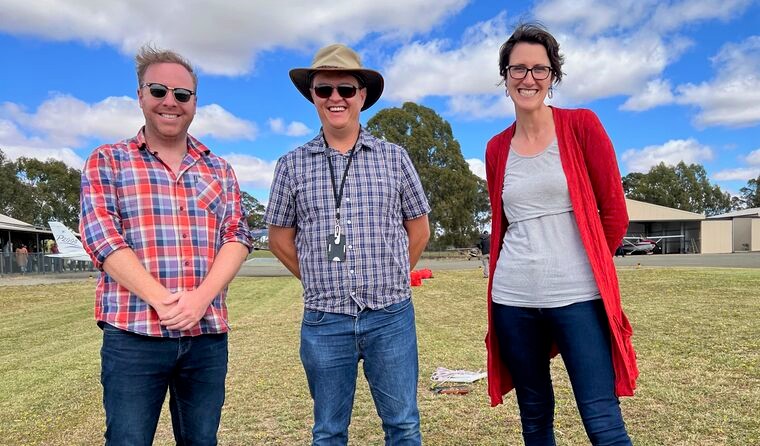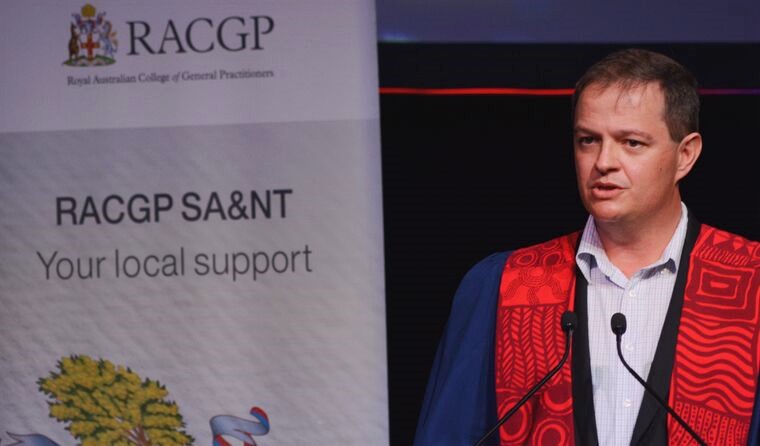Column
Rural health comes down to leadership and support
Workforce shortages persist in rural SA, but the RACGP Rural Chair says there is ‘nothing mythical’ about attracting and retaining GPs.
 RACGP Rural Chair Dr Michael Clements with Dr Amanda Bethell from the Royal Flying Doctor Service.
RACGP Rural Chair Dr Michael Clements with Dr Amanda Bethell from the Royal Flying Doctor Service.
Given the workforce shortage issues affecting numerous towns across South Australia, my recent visit could not have been more aptly timed ahead of the Senate Inquiry, exploring issues affecting general practice services in rural and remote Australia.
First on the agenda was Port Lincoln, a town with a unique set of circumstances, which unlike other towns has a thriving general practice community, but a hospital system in crisis after all the rural generalists recently decided to quit.
I visited two local practices, the Lincoln Medical Centre and the Investigator Clinic, and later that day met with local members at a networking event at the Port Lincoln Hotel, where I heard similar experiences. While Port Lincoln is a beautiful town with much to offer its GPs and their families, most had been feeling undervalued.
They said that the workload had increased, with a growing burden of chronic disease that comes with age and more complex healthcare, and that their ability to work across general practice and the hospital was challenged.
Sustainability requires greater financial investment and compensation, but at the moment SA Health will not come to the table.
Similarly in Clare Valley, where I met with former RACGP Rural Deputy Chair Dr Melanie Considine and her husband, Vice Chair of Rural Doctors Australia (RDA) SA, Dr Gerry Considine, I was told of a thriving and close-knit GP community. Their recruiting efforts have been successful, with an adequate number of doctors, who are pleased with the services they offer.
But they too spoke of troubles with SA Health, and some of the nursing and workforce issues that had resulted, going hand in hand with a rural hospital system under stress and distress.
 Dr Gerry Considine, Dr Michael Clements and Dr Melanie Considine.
Dr Gerry Considine, Dr Michael Clements and Dr Melanie Considine.
In Port Augusta, I met with Dr Amanda Bethell who works for the Royal Flying Doctor Service (RFDS) and local hospital, and is one of the GP leaders who has been doing an amazing job building a culture of support for GPs.
Despite having several general practices, a good hospital, a Flying Doctor Service and leadership on the ground, she spoke of significant difficulty in attracting and retaining doctors.
There they are on a precipice, with a number of GPs due to soon retire but nobody to come in and take their place. And while overseas trained doctors in such circumstances could signal some hope, providing supervision is another challenge they have yet to overcome.
All of these issues once again seemed to culminate in a struggle with SA Health.
I also had the chance to speak with colleagues from Tumby Bay, where there is a great reputation for general practice training and they have been successfully able to recruit GPs. But drive another 100 kilometres north, and you will find towns with no GPs at all.
To me, all these stories indicate that when it comes down to addressing workforce issues, there is nothing mythical about rural health. It ultimately comes down to a combination of leadership on the ground, good practice management, but also the support of the state health services.
I also had the honour of presenting at the Fellowship Ceremony, where GPs were presented with Fellowships of Advanced Rural General Practice. There I met with the Chief Health Officer and South Australian Health Minister, and shared some of the stories from my travels through the state.
 Dr Michael Clements presenting at the RACGP SA&NT Fellowship Ceremony.
Dr Michael Clements presenting at the RACGP SA&NT Fellowship Ceremony.
I also met with former Rural Health Commissioner, Emeritus Professor Paul Worley, RACGP Rural Censor Dr Ken Wanguhu and recently appointed Chair of RACGP SA Dr Danny Byrne. We discussed innovative models of training, and the important role that the profession-led training model will play in both attracting and retaining doctors in rural settings.
During my visit to Waikerie in the Riverland Region, Dr Wanguhu showed me around his general practice and the local hospital, and we later drove out to Berri where I had the chance to visit a recently built, modern practice.
Already, the team has established engagement with the local hospital service, as well as impressive employment models and good leadership. They are designing an inspirational package that will help people all the way from medical school through to Fellowship to anchor down and embed themselves in the region, providing both hospital and general practice services, which sounds very promising.
It was inspiring to see the passion and commitment of GPs on the ground, working together, to secure the future of the local health sector and care for patients. But there is no denying that South Australia, like many other parts of the country, is experiencing a crisis.
We know that the Federal Government has been letting investment into rural general practice lapse through frozen Medicare rebates, and lack of intent.
And while South Australia is not exactly unique, where other states have started to prop up failed general practice services with industrial supports, SA Health is really behind the game and need to modernise how they engage if they are serious about fixing some of the gaps.
Both myself and RACGP President Dr Karen Price were able to draw on the experiences of our college members during the Senate Inquiry, clearly outlining the dire need for new investment and a significant Federal response.
We were keen to point out that in some cases there are state-based solutions, but that we do need a coordinated approach.
This trip to South Australia follows my visits to the Northern Territory and more recently Tasmania, as part of Dr Price’s vision for meaningful advocacy.
I have been really encouraged to see the strong commitment our rural doctors have to their communities and the wonderful services that they are providing. But there is only so far that they can burn themselves out in the face of a system that doesn’t support them.
They need the supports – and certainly the financial supports – to achieve what they want for their communities.
So while we appreciate all of their hard work, we do have a responsibility as a college to act. It is our intent to continue to listen to our members’ views, and to use their stories to advocate very strongly for meaningful action.
Log in below to join the conversation.
advocacy profession-led training RACGP rural South Australia workforce
newsGP weekly poll
Would it affect your prescribing if proven obesity management medications were added to the PBS?